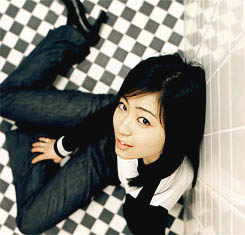
2001-12-17 - "Diva on Campus" - TIME Magazine
"Diva On Campus"
Freshman Utada Hikaru hasn't picked a major, but she's launched a career—she's Japan's biggest pop star
By: Chistopher John Farley
TIME Magazine - Special Music Goes Global Edition / Monday, December 17th, 2001
http://www.time.com/time/musicgoesglobal/asia/mhikaro.html

Utada Hikaru has a hidden life. she appears to be an ordinary
American college student. Last fall she attended classes by day,
hung out with friends by night, and like most of her fellow
Columbia University freshmen, she hasn't settled on a major yet.
But there were rumors about her among the students during
orientation week—stories that were hard to believe.
"Most of my friends know the truth," says Hikaru. "Even before the first day
of school, I was talking to this friend who was going to
Columbia also, and he told me, 'People all know you're coming.'
And I go, 'What do you mean?' And he said, 'Well, all the Asian
kids know, but even the non-Asian students have heard something
about the Japanese Britney Spears coming to their school.'"
She's virtually unknown in the U.S., but Hikaru, 18, is Japan's
biggest pop star. The Japanese media sing her praises: BILINGUAL
STRAIGHT-A STUDENT! AND THE DIVA OF THE HEISEI PERIOD! The
Japanese public devours her music: her debut CD, First Love
(1999), sold more than 9.5 million copies, making it the
best-selling album in Japanese history. Her new CD, Distance, is
selling just as fast. While other Japanese pop divas are content
to sing throwaway tunes in baby-girl tones, Hikaru, who says
that growing up she used to go to sleep to Metallica and wake up
to Pearl Jam, performs songs that draw from R. and B., rap and
even rock. During a recent MTV Unplugged concert, she surprised
fans with a rendition of the Irish rock band U2's song With or
Without You. Except for such occasional covers, Hikaru writes
almost all her own material, combining light melodies and strong
grooves. Her lyrics, though mostly about adolescent angst, can
be intriguingly off center. "Our last kiss/Tasted like
cigarettes," she sings on First Love.
Although the press has compared Hikaru to Spears, the two are
sharply different. First, there's the issue of clothes. Unlike
Britney, Hikaru keeps hers on. "I'm not like a gorgeous bombshell
or anything like that," she says modestly. "It was just always my
music at the front." Mobbed in Japan, she relishes anonymity in
America. "I can never really enjoy being famous," she says. "So
when I can just take a walk and go grocery shopping in New York,
it takes a huge load off my back and I feel great. I feel human
again, almost."
Hikaru was born in New York City but raised part-time in Tokyo.
"When people ask me exactly how much time I spend in each
country, I always tell them I have no idea," she says. "Because
my parents have taken me back and forth ever since I was a
baby." Her father Teruzane Utada is a producer and musician who
now runs her management company. Her mother Keiko Fuji was a
popular enka (Japanese ballad singer) in the 1970s who broke her
fans' hearts by giving up her career and moving to the U.S. to
find a little peace. ("I don't sing anymore," is all Fuji says
now, smiling.) Hikaru says she got her start when she followed
her parents into the studio and began to make recordings around
age seven. ("No, younger!" shouts her father from nearby.) Like
her mother, Hikaru plans to retire young—as early as 28—and
perhaps pursue neuroscience. "I kind of see myself in a white
coat in a lab, working till late evening in front of test
tubes," she says. It's hard to imagine that Spears has a similar
vision of her future.
For now, though, Hikaru has taken leave from school (she plans
to return soon) to focus on her music and establish her career
in the U.S. She recently performed a song called Blow My
Whistle, which was included on the sound track of the movie Rush
Hour 2. Produced by the Neptunes, one of the hottest American
hip-hop production duos around, the song features a cameo from
gangsta rapper Foxy Brown. Hikaru said her producers were
worried at first that she and Brown might fight, given their
different temperaments and backgrounds. They got along just
fine. The idea of having her on the song came from Pharrell
(Williams, one-half of the Neptunes), says Hikaru. "He said Foxy
and I would make a very strong combination, the two of us being
such contrasting characters: the crazy, revealing, in-your-face
Ill Na Na [Foxy's nickname] and the more settled and slightly
mysterious Asian girl."
The music industry is ruled by stereotypes: whites rock, blacks
rap and croon soul, and few dare to cross the color line. There
are hardly any Asian pop acts of prominence in the U.S. (no
wonder some see Hikaru as mysterious). Hikaru is mounting a
challenge to the status quo. On Blow My Whistle, her voice is
more resonant than on her Japanese-language songs, and the track
boasts beats that are more forceful. She leaves no doubt: she's
got Mary J. Blige, 125th Street-type soul. There's another twist.
The credits bill her as "Hikaru Utada"—using the Western custom
of listing the surname last. Says Hikaru: "I just figured it's a
good way to separate my English and Japanese personas." After the
interview, she sends a follow-up e-mail that begins, "This is
Hikaru Utada. (Or is it Utada Hikaru...oh, whichever!)" She's
still a freshman. She'll work things out.
WITH REPORTING BY TOKO SEKIGUCHI/TOKYO
TIME's Utada Hikaru Photogallery / Bio / Discography:
http://www.time.com/time/musicgoesglobal/asia/popup/photo.html
|
|